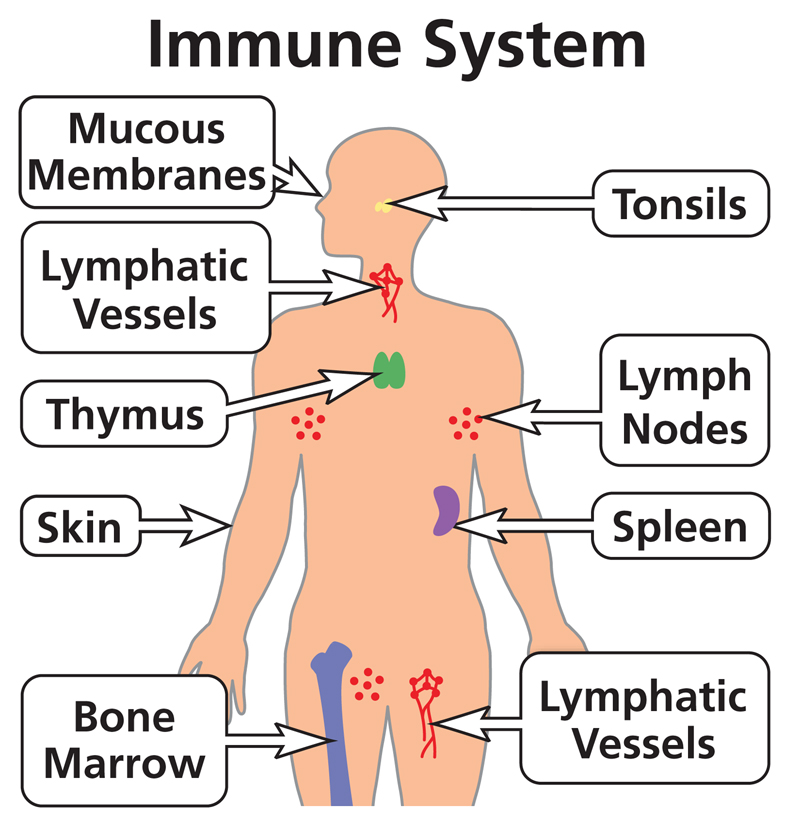What is the Immune System?
The immune system is a sophisticated system of cells, tissues, and organs that cooperate to defend the body against dangerous pathogens like viruses, bacteria, fungi, and parasites. It is essential for locating and eliminating foreign intruders that can result in harm or infection. There are many different parts that make up the immune system, such as lymph nodes, the spleen, white blood cells, and antibodies. Together, these elements enable the body to identify and eliminate dangerous chemicals while also knowing how to react to such hazards in the future. The immune system is crucial for preserving health and preventing disease overall.
Table of Contents
The immune system is in charge of defending your body from pathogens like bacteria, fungi, viruses, and parasites. A powerful immune system is necessary for sustaining health and preventing diseases. We’ll look at some natural strategies to strengthen your immune system in this blog post.

Obtain Enough Sleep
The ability to sleep is essential for keeping excellent health. A weaker immune system and greater susceptibility to illness might result from sleep deprivation. Adults need at least 7-8 hours of sleep per night to preserve their health, according to studies. Cortisol, a hormone that inhibits the immune system, can also be produced in greater quantities as a result of inadequate sleep.
Exercise consistently
Regular exercise has been shown to strengthen the immune system by making it easier for immune cells to move around the body. Exercise also assists in lowering stress, which can harm the immune system. To strengthen your immunity, try to get at least 30 minutes of moderate activity each day.
Consume a Healthy Diet
A strong immune system depends on eating a balanced diet that is high in fruits, which provide vitamins for the immune system, vegetables, lean meats, and healthy fats. Because they include the vitamins and minerals the immune system needs to function, and the nutrients in these foods to boost immune system. Keep hydrated.
Maintain a strong immune system
Maintaining a strong immune system requires drinking plenty of water. Water aids in the removal of toxins from the body and aids in maintaining hydration, both of which are necessary for a healthy immune system. Try to consume eight glasses of water or more each day.
Reduced tension
The immune system might suffer from stress because it causes the body’s white blood cells to decrease in number. Moreover, stress leads to an increase in cortisol production, which can weaken the immune system. Try to relax by engaging in activities like yoga, meditation, and deep breathing.
Receiving Enough Vitamin D
An immune system that is healthy requires vitamin D. It can assist in preventing infections and regulating the immune system’s operation. Fatty fish, egg yolks, and fortified milk are examples of foods that contain vitamin D. Solar radiation is another source of vitamin D.
Avoid drinking and smoking.
The immune system can be harmed by smoking and drinking because they lower the body’s levels of white blood cells. Smoking can impede the body’s ability to fight infections by harming the lungs. Consider stopping if you smoke or drink to strengthen your immune system.

Use probiotics.
Live bacteria called probiotics can assist to balance the bacteria in the gut. A robust immune system requires a healthy gut microbiota. Probiotics can be obtained as supplements or in fermented foods such as yogurt, kefir, and sauerkraut.
Get Clean Hands
Regular hand washing is crucial for halting the spread of dangerous diseases. If soap and water are not available, apply hand sanitizer for at least 20 seconds after washing your hands with soap and warm water.
Get immunized
Immunizations are a secure and reliable method of preventing infectious diseases. Being vaccinated can aid in preventing you from contracting a number of illnesses, including as the flu, measles, and pneumonia. Find out which immunizations your doctor recommends for you by speaking with them.
Disorders of the immune system
Your body’s defense against infections and other hazardous invaders is its immune system. Without it, viruses or bacteria would make you ill all the time.
Specialized cells, tissues, and organs make up your immune system, which functions as a team to defend you.
An important component of the immune system is the lymphatic or lymphatic system. It is a network of arteries and lymph nodes. Thin tubes known as lymphatic vessels are found throughout the body and branch like blood veins. They transport lymph, a transparent fluid. Immune system cells, waste materials, and tissue fluid are all present in lymph. Little, bean-shaped immune cell clusters known as lymph nodes are linked by lymphatic veins. They contain white blood cells, which are capable of capturing invaders like cancer cells as well as viruses and germs.
The immune system’s cells are called white blood cells. They are created in the bone marrow, one of your lymph organs. The spleen and thymus are two other lymph organs.
What can go wrong with your immune system?
Immune system disorders are when your immune system doesn’t function as it should. You could have a weakened immune system from birth. Primary immune insufficiency is what this is.
Get ill with an illness that impairs your defenses. Acquired immune deficiency is what this is.
have an overactive immune system. A reaction to an allergen may result in this.
your immune system is biased against you. We refer to this as an autoimmune illness.
Immune system Conditions
These are a few typical instances:
severely compromised immune system (SCID)
This is an illustration of an immunological disorder that exists from birth. Children are constantly at risk for bacterial, viral, and fungal infections. Sometimes, this condition is referred to as “bubble boy illness.” A boy had to live in a plastic bubble in the 1970s, where everything was antiseptic. Important white blood cells are lacking in SCID children.
developed immune weaknesses that are temporary
For instance, several medications can impair your immune system. Those taking chemotherapy or other cancer-treating medications may experience this. Moreover, it can occur in recipients of organ transplants who take medication to avoid organ rejection. Infections like measles, mono (mononucleosis), and the flu virus can also temporarily impair immunity. Moreover, unhealthy eating habits, alcoholism, and smoking might impair your immune system.
AIDS. An acquired viral infection called HIV, which results in AIDS, kills crucial white blood cells and impairs the immune system. Individuals with HIV/AIDS develop severe infections that the majority of people can fend off. Opportunistic infections are what these infections are known as because they profit from weakened immune systems.
excessive immunological response
Your immune system may respond to chemicals in the environment that are typically safe if you were born with specific genes. Allergens are these compounds. The most typical manifestation of a hyperactive immune system is an allergic reaction. Foods, pollen, dust, and mold are a few examples of allergies.
Some ailments brought on by an overactive immune system include:
Asthma. Your lungs’ reaction may result in coughing, wheezing, and difficulty breathing. Common allergens like dust or pollen or an irritant like tobacco smoke might set off an asthma attack.
Eczema. Atopic dermatitis is an itchy rash brought on by an allergen.
Rhinitis is caused by allergies. Sneezing, running nose, sniffling, and nasal passage swelling are brought on by indoor allergens like dust and pets or outdoor allergens like pollens or molds.
Immune disorder
The body assaults normal, healthy tissues in autoimmune disorders. There is no known cause. Very likely, a person’s genes are activated by both something in their environment and their genes.
There are three prevalent autoimmune diseases:
diabetes type 1. Insulin-producing cells in the pancreas are attacked by the immune system. Sugar is taken out of the blood by insulin and used as fuel.
Arthritis rheumatoid. The joints become swollen and malformed as a result of this type of arthritis. Some sufferers of rheumatoid arthritis have rheumatoid factor auto-antibodies in their blood.
Lupus. This illness targets organs such as the skin, kidneys, and lungs. Blood samples from lupus sufferers are shown to contain a wide variety of auto-antibodies.
Although the specific origin of autoimmune illnesses is unknown, other factors appear to be at play. Find out as much as you can about immune system disorders if you have them. And to manage it, collaborate closely with your healthcare professionals.
SYMPTOMS OF IMMUNE SYSTEM PROBLEMS
The immune system protects the body from viruses, bacteria, fungi, parasites, and other harmful microorganisms. When the immune system is weak, it can cause a number of signs and health problems. In this post, we’ll look at 16 typical signs of immune system issues.
When the immune system is weak, infections like colds, flu, and urinary tract infections can come back more often.
Fatigue: A common sign of immune system issues is chronic weariness. Daily tasks may become challenging, and it may lower the overall quality of life.
Immune system issues may be the cause of digestive issues like diarrhea, constipation, and stomach pain.
Skin rashes – When the immune system isn’t working properly, skin rashes and other skin issues might appear.
Allergies – Sneezing, itching, and watery eyes are just a few of the symptoms that might appear when the immune system overreacts to harmless substances.
Joint pain: immune system issues can cause painful joint pain and inflammation.
Muscle weakness is often a sign of a problem with the immune system, and it can make it hard to do everyday things.
Swollen lymph nodes – Because they are a component of the body’s immune system, swollen lymph nodes may be a sign of an immune system issue.
Headaches – Severe and incapacitating headaches and migraines can be brought on by immune system issues.
Respiratory issues – When the immune system is not operating properly, respiratory issues, such as asthma and bronchitis, can happen.
Lupus, rheumatoid arthritis, and multiple sclerosis are examples of autoimmune diseases, which occur when the immune system attacks the body’s own tissues.
When inflammation lasts for a long time, it can lead to health problems like heart disease, cancer, and diabetes. Chronic inflammation is a common sign of immune system dysfunction.
Pain that doesn’t go away is often a sign that your immune system isn’t working right, and it can be hard to treat.
Mental health problems like anxiety, depression, and brain fog can be caused or made worse by problems with the immune system.
Weight changes, such as weight gain or loss, can be brought on by immune system issues.
Poor wound healing – As the immune system is in charge of repairing injured tissues, poor wound healing is a common sign of immune system difficulties.
It is crucial to consult your healthcare provider if you are experiencing any of these symptoms. They can help you figure out if your symptoms are caused by problems with your immune system and suggest ways to treat them. A strong immune system can also be helped by living a healthy life. This means getting enough sleep, working out often, eating a balanced diet, and avoiding stress as much as possible.
Also, read “Unlock Your Potential Weight Loss: The Ultimate Guide to Sustainable and Healthy Weight Loss”




Pingback: Discover What occurs to our body when we eat excessively? - Minions
Pingback: Chronic Pain: Discover Accessible Effective Techniques for Managing Medical and Home Remedies - Minions
Pingback: Sea Moss Discover these 7 amazing health Benefits - Minions
Pingback: Yerba mate Discover these 5 amazing health benefits - Minions
Pingback: Mango: Discover these 8 health benefits - Minions
Pingback: Nettle Leaf Discover these 7 health benefits - Minions
Pingback: Ginger Discover these amazing 8 health benefits - Minions
Pingback: Smoking: Discover 7 harmful effects - Minions
Pingback: Help for Horicia Wright: A Single Mother’s Fight Against Breast Cancer - Minions